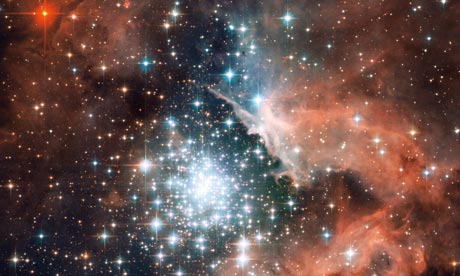
All good books test the imagination. When you open them you must imagine for yourself Raymond Chandler's rainy Los Angeles in the 1930s, or Terry Pratchett's turtle-backed Discworld. You cannot in reality go to either place, but in another sense you can.
This book is different. It requires you to imagine a truly unimaginable world, which turns out to be the one that you already inhabit.
On page 44 of the Penguin edition, David Deutsch describes the interference pattern from a single photon passing through a single slit and infers from this experiment "the existence of a seething, prodigiously complicated, hidden world of shadow photons" and goes on from that to further infer "a huge number of parallel universes, each similar in composition to the tangible one, and each obeying the same laws of physics, but differing in that the particles are in different positions in each universe."
Welcome to the multiverse. This isn't the same multiverse as the other one you've been told about. In that one, brand-new universes spontaneously bud off from each other, so many bubbles in the champagne fountain of eternity. Some of these bubble universes are snuffed out swiftly and some last ever such a long time, and some might even be hospitable to intelligent life. But we could never know anything about any of the others, only this one.
Deutsch's multiverse is different. It is co-incident with, somehow contiguous with, and weakly interacting with, this one. It is a composite, a layer cake, a palimpsest of universes very similar but not quite identical to each other.
The number of these shadow universes is enormous (on page 44 Deutsch reasons from the one-photon experiment that there must be a trillion of them, and later in the book airily invites a quantum computational calculation involving 10500 universes, which is another number I cannot imagine.
But my inadequate imagination is my problem, not his: Deutsch has thought through what he wants to say about the nature of the reality we share, and he makes his points with patience and clarity. He wants not to explain the universe, but to understand it: to understand everything. And there are several eerie moments in this book when you think that he might, just might, be about to convince you that you, too, could follow his reasoning.
He addresses Darwin and Dawkins and makes a profound and fresh case for saluting the importance of life. The mass of the human brain may be trifling but the knowledge it contains encompasses the universe and the notion of at least a trillion others. Knowledge is not a simple thing, and it is not passive. The knowledge implicit in DNA, and all the environmental niches that are host to evolutionary life, has shaped the world, and will reshape it.
Deutsch plays beautifully with the Newtonian and the commonsense concepts of time (both of which are wrong and of course he is hardly the first to say so) and although at the end of this section this reader was still confused about the nature of time, Deutsch's summation is almost serenely clear. "Time does not flow. Other times are just special cases of other universes."
This is a deep and ambitious book and there were plenty of moments when I was out of my depth (the Platonic dialogue between Deutsch and a Crypto-inductivist left me with a pronounced sinking feeling). But the sheer adventure of thinking not just out of the envelope but right out of the Newtonian universe is exhilarating.
The chapter on time travel is a delight, although I was a little thrown by the line "Future-directed time travel, which essentially requires only efficient rockets, is on the moderately distant but confidently foreseeable technological horizon," in which almost every word demands a gloss, footnote or qualification.
That said, he becomes wonderfully clear when he addresses the Grandfather Paradox. No time traveller can visit Shakespeare's time clutching a copy of the Complete Works, and help a struggling author to complete Hamlet. Or rather he can, but in the multiverse view the traveller has not come from the future of that copy of Shakespeare.
This book wasn't my idea – it was suggested by the club member TopTroll – but I am delighted by the choice. Terms such as quantum computing, virtual reality, Turing machines, mathematics, induction and epistemology all have acquired fresh meaning and palpable importance.
And just as you begin to think The Fabric of Reality will conclude with a somewhat solemn philosophical summation about the fabric of reality, it changes course, and makes a cheerful study of Frank Tipler's 1995 vision of the final collapse of the universe, The Physics of Immortality.
Tipler proposed the big crunch as the Omega point, a moment near the end of spacetime in which those characteristics identified with God – omniscience, omnipresence and omnipotence – will fleetingly be possible, along with the resurrection of the dead.
One guesses they won't be possible, but what a brilliant vehicle for a climactic ending to Deutsch's book. A study that brings together the multiverse of physics, mathematics, computation, epistemology, philosophy, history, evolution and time travel closes with the biggest bringing-together of all time, right at the end of space and time itself.
Now that's what I call a really big picture.
Next up: Keep the suggestions coming, but since there have not been any lately, what about something creative from EO Wilson, novelist, entomologist and prophet of ecological disaster? His 1994 autobiography Naturalist (Island Press, 2006) may not be a science book in its strictest sense, but it is certainly a book about the making of a scientist.

